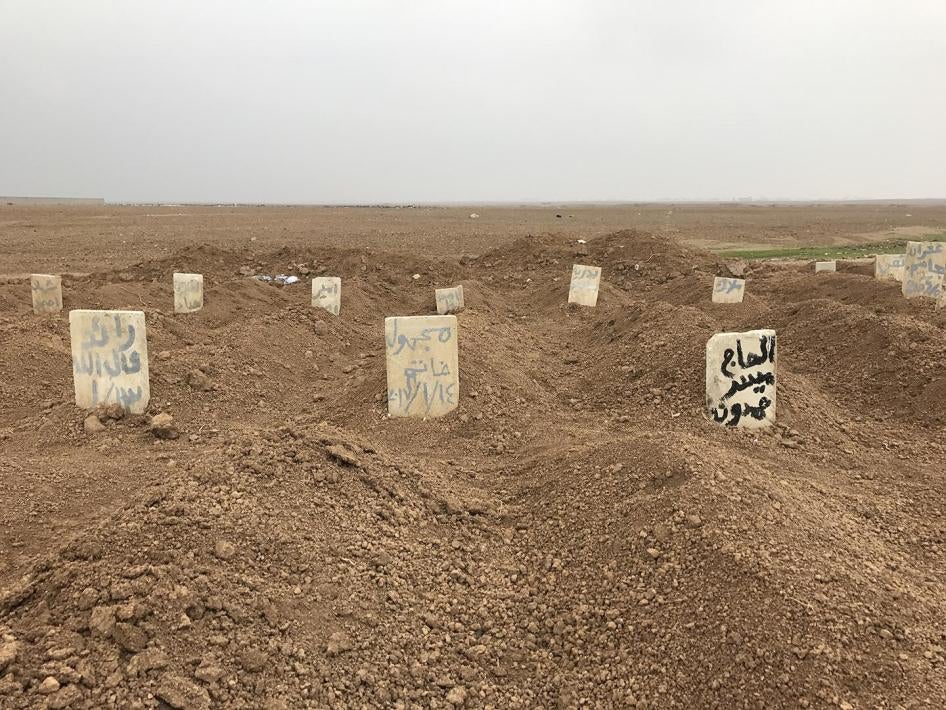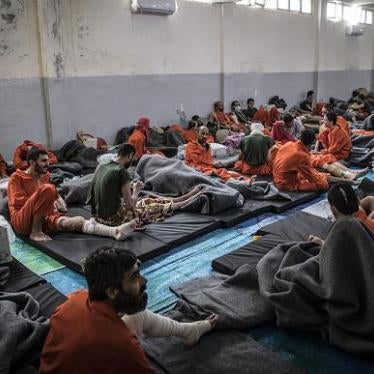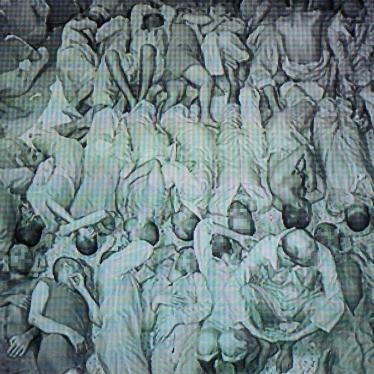(Beirut) – At least 26 bodies of blindfolded and handcuffed men have been found in government held areas in and around Mosul since the operation to retake the city began in October 2016, Human Rights Watch said today.
In 15 of the cases, local armed forces told a foreign journalist that the men were extrajudicially killed by government security forces who had them in custody under suspicion of Islamic State (also known as ISIS) affiliation. In the remaining cases, reported by local and international sources, the sites of the apparent executions – all in government held territory – raise concerns about government responsibility for the killings. A foreign journalist also said that a government official told them that a Sunni Popular Mobilization Forces (known as the PMF or Hashd al-Sha'abi) unit, which is part of the government forces working to retake Mosul, was responsible for the extrajudicial killing of 25 men in their custody and dumping the bodies in the Tigris River.
“The bodies of bound and blindfolded men are being found one after the other in and around Mosul and in the Tigris River, raising serious concerns about extrajudicial killings by government forces,” said Lama Fakih, deputy Middle East director at Human Rights Watch. “The lack of any apparent government action to investigate these deaths undermines the government’s statements on protecting detainee rights.”
Extrajudicial executions during an armed conflict are war crimes and if widespread or systematic, carried out as part of policy, would constitute crimes against humanity.
Iraqi forces, including the Popular Mobilization Forces, are screening and detaining men fleeing Mosul, in some cases in unidentified and informal detention centers where they are cut off from contact with the outside world. The authorities have not released any information on the number of people detained, or being investigated or charged. Given past abuse of people detained by the PMF and other government military and security forces, Human Rights Watch has flagged concerns about detainees’ treatment, including possible executions.
On May 13 and 15, 2017, two groups of aid workers and a foreign journalist said that they saw groups of corpses, 15 bodies in all, by the side of a road between the village of Athba and town of Hammam al-Alil, about 15 kilometers south of west Mosul. The area is entirely under the control of Iraqi government forces. One group said they had driven past the area a day earlier and the bodies had not been there, suggesting they were killed on May 12 or 13.
Local armed forces at the nearest checkpoint told the journalist that they saw Iraqi “security forces” bring the men to the area and shoot them. The journalist observed many bullet casings in the area on May 15. The journalist found an identity card on one of the bodies and confirmed with a contact within the National Security Service, a security body under the ultimate control of the prime minister, that the name was on their government database of about 90,000 people wanted for ISIS-affiliation.
Human Rights Watch obtained seven photos of the bodies at the site, which show the corpses in various lying and kneeling positions, all blindfolded with their hands bound with plastic handcuffs or fabric.
Human Rights Watch shared these photos with Stefan Schmitt of the International Forensic Program at Physicians for Human Rights, who said that there were no indications that the bodies were dragged or placed in the locations, such as drag marks or shifting of clothing. The positioning of at least two of the bodies was consistent with kneeling prior to execution and then falling forward, he said, and he concluded that it was likely the victims were executed in the place they were found.
On April 20, 2017, Reuters reported that over the course of the last several months, residents of Qayyarah, a town 60 kilometers south of Mosul and firmly under Iraqi government control since August 2016, had seen at least six bodies floating down the Tigris River blindfolded with their hands bound. On May 21, a local fighter told Human Rights Watch he saw another bound body floating in the river by the bridge near Qayyarah. The Tigris River flows south, which suggests that the bodies were placed in the river north of Qayyarah, but could not have come from ISIS-controlled territory because of several dams in the river south of Mosul.
An officer of the PMF 90th Brigade told Human Rights Watch over the phone that his forces were holding detainees in bathrooms of abandoned homes in Safina, a village 20 kilometers north of Qayyarah, along the Tigris River, and said they had “business with the men” they were holding. He said no visitors were allowed at the detention sites. On May 21, a foreign journalist told Human Rights Watch that a government official informed them that the 90th Brigade was holding alleged ISIS affiliates in the same village. According to the journalist, the official said the 90th Brigade had been holding detainees there for at least four months, and he personally knew of at least 25 detainees held there whom the 90th Brigade had executed and dumped into the river.
In several other cases, bound and blindfolded corpses of men whose bodies bore signs of being executed were found in government held parts in and around Mosul, aid workers and journalists told Human Rights Watch.
At the end of April 2017, an aid worker visited the morgue at Qayyarah hospital that had reopened about two months earlier. Human Rights Watch reviewed a photo the aid worker took inside the morgue of a large pile of bodies. On the top of the pile was a man who had been shot. He was lying chest down, with a blindfold and with his hands bound with plastic handcuffs. Human Rights Watch visited the hospital in mid-May and two head doctors told researchers that they had received orders from the health and defense ministers that they were not to respond to any information requests on the morgue, or allow any visitors. They did not provide a reason, but said it was a “red line.”
In late January, another foreign journalist showed Human Rights Watch pictures of the bodies of two bound men in a residential neighborhood of east Mosul fully under the control of Iraqi forces that he had taken two days earlier. Residents said they knew nothing about the identities of the men or circumstances of their death. Also in late January, Human Rights Watch interviewed a resident of the outskirts of Gogjali, a suburb of east Mosul, who pointed out a spot where he had found the body of a blindfolded man in the mud next to a trench. He and neighbors had buried the body. He said he knew nothing about the man’s death or identity.
“If Iraqi authorities want civilians who spent over two years living under ISIS to feel safe and protected, they need to ensure that anyone responsible for murdering prisoners is brought to justice,” Fakih said.









